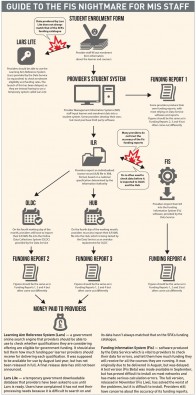The government has been accused of trying to “retrospectively justify an unjustifiable policy” with an impact assessment of plans to reduce funding for 18-year-olds that confirmed colleges would be hit harder than school sixth forms.
The assessment of plans to reduce funding for 18-year-old learners to 17.5 per cent less than 16 and 17-year-olds was released on Monday, January 13 — more than three weeks after it was promised by Education Secretary Michael Gove.
Skills Minister Matthew Hancock has assured MPs in a written answer to parliament that the assessment was drawn up before the funding rate cut was announced on December 10.
But it nevertheless shows that FE colleges will be among the worst-hit of all institutions — with an average reduction in funding of three per cent.
For land-based colleges it’s 2.5 per cent, for commercial and charitable providers it’s 1.5 per cent, and for sixth form colleges it’s 1.2 per cent.
But for school sixth forms it’s just 0.4 per cent. However, the report does not say how much cash the funding rate cut, due next academic year, is expected to save.
It was further revealed that no decision to reduce the impact of the policy could be made until the end of next month at the earliest.
James Kewin, deputy chief executive of the Sixth Form Colleges Association, told FE Week: “This is not a serious impact assessment — it is an attempt to retrospectively justify an unjustifiable policy.
“Fundamentally, we do not accept that there is a case for any further cuts to the 16 to 19 budget. Some sixth form colleges are already on course to lose a third of their funding by the end of this parliament. The burden of deficit reduction is once again falling disproportionally on colleges rather than schools.”
One of the main concerns raised about the proposal was that black and minority ethnic (BME) students would be disproportionately affected. And although the report accepts there is a higher proportion of BME learners among full-time 18-year-olds than the total 16 to 18-year-old student population, it does not say how adversely they will be affected.
Association of Colleges chief executive Martin Doel said: “The impact assessment confirms what we told the Department for Education before Christmas — the decision to cut funding by 17.5 per cent disproportionately affects 18-year-olds who are taking vocational courses in colleges.
“It also is more likely to affect black and minority ethnic students and those in London.”
National Union of Students president Toni Pearce said: “This cut will affect FE colleges more than school sixth forms, meaning FE students are yet again being treated like second class citizens.
“The FE system provides important second chances for millions of people, where all learners are treated as adults and given the opportunity to build their learning experience with their teachers, which is why cutting funding for these groups of students is incredibly damaging.”
A letter originally sent out by the Education Funding Agency last year said the decision, announced on December 10, had been made as those who were 18 at the start of the academic year “will already have benefited from two years of post-16 education and will not therefore need as much non-qualification provision within their study programmes as 16 and 17-year-olds”.
——————————————————————–
Editorial: A shameful assessment
Whether the impact assessment for the 18-year-old rate cut was written before or after the announcement will be for others to debate.
More importantly, now that it has been published, what do we learn from it? And equally, what do we not learn from it?
Unsurprisingly, we learn that FE colleges supporting BME learners on vocational courses are hit hardest, while school sixth forms come out as good as unscathed.
Shameful.
Surprisingly, for a funding-related impact assessment, we don’t learn anything about the amount of money the government think it will save with this cut.
Shameful.
Education Secretary Michael Gove has already called his own policy “regrettable” and indicated those colleges hit hardest may get a degree of protection — or ‘cushioning’ as funders like to call it.
This is not good enough.
It’s an unfair, unjustifiable and under-researched policy in which Mr Gove should feel no shame in binning.
Chris Henwood

